| Listing 1 - 10 of 13 | << page >> |
Sort by
|
Book
ISBN: 9782364411142 2364411149 Year: 2014 Publisher: Dijon: EUD,
Abstract | Keywords | Export | Availability | Bookmark
 Loading...
Loading...Choose an application
- Reference Manager
- EndNote
- RefWorks (Direct export to RefWorks)
À l’ère postmoderne des incertitudes économiques et des défis identitaires qui sont ceux du XXIe siècle, penser l’être humain, c’est aussi explorer ou définir les univers non humains qui l’entourent. Toutefois, cette exploration est le plus souvent abstraite, figurative ou illustrative et reflète quasi exclusivement des intérêts humains. Elle instrumentalise ainsi les animaux, relégués à un rôle accessoire ou symbolique au profit d’une analyse concernée par l’humain et sa « différence ». Cet ouvrage se départ de cette tendance pour considérer les responsabilités humaines en regard des souffrances animales. Ce thème est en effet négligé par la pensée contemporaine, qui suit la trace anthropocentrique des priorités humaines d’une part, et par ailleurs rechigne à mener de front réflexion et militantisme. À travers une approche interdisciplinaire audacieuse, philosophes, vétérinaires, juristes, artistes, critiques littéraires, sociologues et historiens font ici part de leur désir de bouleverser les traditions humaines qui perpétuent l’oppression des animaux. Ils communiquent le fruit de leur expérience et de leur réflexion tout en exprimant l’urgence de leur engagement. En rompant le silence qui légitimise l’exploitation insensée de tous les êtres non humains, ils examinent certaines des conséquences de ces traditions, mais montrent également comment de nouvelles voies/x peuvent être prises, clamées et entendues afin de rendre possible la connexité de « différents modes d’existence » (Bruno Latour).
Animal rights --- Animal welfare --- Animal welfare in literature --- Animaux --- Moral and ethical aspects --- Moral and ethical aspects. --- Droits --- Aspect moral --- Protection --- Protection, dans la littérature --- Abused animals in literature --- Animaux maltraités --- Droit --- Dans la littérature --- Protection, dans la littérature --- Droit. --- Aspect moral. --- Dans la littérature. --- Animaux maltraités --- Dans la littérature.

ISBN: 9780813919065 0813919061 0813919053 Year: 2000 Publisher: Charlottesville (Va.): University press of Virginia,
Abstract | Keywords | Export | Availability | Bookmark
 Loading...
Loading...Choose an application
- Reference Manager
- EndNote
- RefWorks (Direct export to RefWorks)
Nature in literature. --- Ecology in literature. --- Environmental protection in literature. --- Environmental literature --- Nature dans la littérature --- Ecologie dans la littérature --- Environnement --- Ecologie --- History and criticism --- Protection, dans la littérature --- Documentation --- Histoire et critique --- Nature in literature --- Ecology in literature --- Environmental protection in literature --- Literature --- Theory, etc. --- Nature dans la littérature --- Ecologie dans la littérature --- Protection, dans la littérature --- Environmental literature - History and criticism - Theory, etc. --- Literature - History and criticism - Theory, etc.
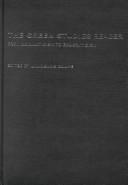
ISBN: 0415204070 0415204062 9780415204064 9780415204071 Year: 2000 Publisher: London: Routledge,
Abstract | Keywords | Export | Availability | Bookmark
 Loading...
Loading...Choose an application
- Reference Manager
- EndNote
- RefWorks (Direct export to RefWorks)
82:3 --- Literatuur en maatschappijwetenschappen --- Littérature anglaise --- Nature dans la littérature. --- Littérature américaine --- Environnement --- Romantisme --- Écologie dans la littérature. --- Nature --- Romantisme (littérature) --- Écocritique. --- Thèmes, motifs. --- Histoire et critique. --- Protection, dans la littérature. --- Dans la littérature. --- 82:3 Literatuur en maatschappijwetenschappen --- Romantisme (littérature). --- American literature --- Ecology in literature --- English literature --- Environmental protection in literature --- Nature in literature --- Romanticism --- Nature in poetry --- History and criticism --- Thematology --- anno 1800-1899 --- anno 1900-1999
Book
ISBN: 9780729411936 0729411931 Year: 2017 Volume: 2017:04
Abstract | Keywords | Export | Availability | Bookmark
 Loading...
Loading...Choose an application
- Reference Manager
- EndNote
- RefWorks (Direct export to RefWorks)
The animal-human relationship challenged not only disciplinary boundaries - between poetry and science, art and animal husbandry, natural history and fiction - but also the basic assumptions of human intellectual and cultural activity, expression, and self-perception. This is specifically apparent in the re-evaluation of sentiment and sensibility, which constitutes a major theme of this chronologically organised volume. Authors engage with contemporary reactions to the commodification of animals during the period of British imperialism, tracing how eighteenth-century ecological consciousness and notions of animal identity and welfare emerged from earlier, traditional models of the cosmos, reassessing late eighteenth-century poetic representations of the sentimental encounter with the animal other. They show how human experience was no longer viewed as an iterative process but as one continually shaped by the other. In concluding chapters authors highlight the political resonances of the animal-human relationship as it was used both to represent and to redress the injustices between humans as well as between humans and animals. Through a multi-faceted study of eighteenth-century European culture, authors reveal how the animal presence - both real and imagined - forces a different reading not only of texts but also of society..
Animal welfare --- Animal welfare in literature. --- Human-animal relationships. --- Animaux --- Relations homme-animal --- History. --- Moral and ethical aspects. --- Protection --- Histoire --- Aspect moral --- Protection, dans la littérature --- Human-animal relationships --- History --- Animal-human relationships --- Animal-man relationships --- Animals and humans --- Human beings and animals --- Man-animal relationships --- Relationships, Human-animal --- Animals --- Protection, dans la littérature --- History of civilization --- History of Europe --- anno 1600-1699 --- anno 1700-1799 --- anno 1800-1899
Book
Year: 1995 Publisher: Cambridge (Mass.) : Belknap Press of Harvard University Press,
Abstract | Keywords | Export | Availability | Bookmark
 Loading...
Loading...Choose an application
- Reference Manager
- EndNote
- RefWorks (Direct export to RefWorks)
With the environmental crisis comes a crisis of the imagination, a need to find new ways to understand nature and humanity's relation to it. This is the challenge Lawrence Buell takes up in The Environmental Imagination, the most ambitious study to date of how literature represents the natural environment. With Thoreau's Walden as a touchstone, Buell gives us a far-reaching account of environmental perception, the place of nature in the history of western thought, and the consequences for literary scholarship of attempting to imagine a more "ecocentric" way of being. In doing so, he provides a major new understanding of Thoreau's achievement and, at the same time, a profound rethinking of our literary and cultural reflections on nature. Intricate and challenging in its arguments, yet engagingly and elegantly written, The Environmental Imagination is a major work of scholarship, one that establishes a new basis for the reading of American nature writing. The green tradition in American writing commands Buell's special attention, particularly environmental nonfiction from colonial times to the present. In works by writers from Crevecoeur to Wendell Berry, John Muir to Aldo Leopold, Rachel Carson to Leslie Silko, Mary Austin to Edward Abbey, he examines enduring environmental themes such as the dream of relinquishment, the personification of the nonhuman, an attentiveness to environmental cycles, a devotion to place, and a prophetic awareness of possible ecocatastrophe. At the center of this study we find an image of Walden as a quest for greater environmental awareness, an impetus and guide for Buell as he develops a new vision of environmental writing and seeks a new way of conceiving the relation between human imagination and environmental actuality in the age of industrialization.
Américains dans la littérature.
---
Environmental protection in literature.
---
Environmental protection
---
Environmental protection.
---
Environnement
---
Kultur.
---
Letterkunde.
---
Milieufilosofie.
---
National characteristics, American, in literature.
---
Natur
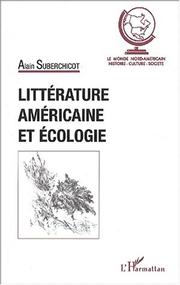
ISBN: 2747525376 9782747525374 Year: 2002 Publisher: Paris : Harmattan,
Abstract | Keywords | Export | Availability | Bookmark
 Loading...
Loading...Choose an application
- Reference Manager
- EndNote
- RefWorks (Direct export to RefWorks)
Environnement --- Littérature américaine --- Littérature américaine. --- Nature --- Nature. --- Protection de l'environnement. --- Protection de la nature. --- Thème littéraire. --- Écologie dans la littérature. --- Écologie. --- Écologisme --- écologie --- Protection --- Dans la littérature. --- Protection, dans la littérature. --- Thèmes, motifs --- Conservation, dans la littérature. --- Berry, Wendell, --- Dillard, Annie, --- Leopold, Aldo, --- Lopez, Barry Holstun, --- Steinbeck, John, --- 19e siècle. --- 20e siècle. --- American literature --- Nature in literature. --- Environmental protection in literature. --- Philosophy of nature in literature. --- Wilderness areas in literature. --- Outdoor life in literature. --- Landscapes in literature. --- Ecology in literature. --- Ecocriticism. --- History and criticism. --- US literature - Nature - 19th-20th centuries - Criticism.
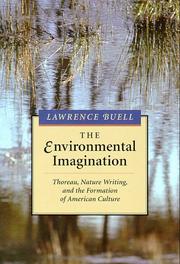
ISBN: 0674258622 0674258614 9780674258617 9780674258624 0674262425 0674262433 Year: 1995 Publisher: Cambridge (Mass.): Belknap press of Harvard university press,
Abstract | Keywords | Export | Availability | Bookmark
 Loading...
Loading...Choose an application
- Reference Manager
- EndNote
- RefWorks (Direct export to RefWorks)
With the environmental crisis comes a crisis of the imagination, a need to find new ways to understand nature and humanity's relation to it. This is the challenge Lawrence Buell takes up in "The Environmental Imagination," the most ambitious study to date of how literature represents the natural environment. With Thoreau's "Walden" as a touchstone, Buell gives us a far-reaching account of environmental perception, the place of nature in the history of western thought, and the consequences for literary scholarship of attempting to imagine a more "ecocentric" way of being. In doing so, he provides a major new understanding of Thoreau's achievement and, at the same time, a profound rethinking of our literary and cultural reflections on nature. The green tradition in American writing commands Buell's special attention, particularly environmental nonfiction from colonial times to the present. In works by writers from Crevecoeur to Wendell Berry, John Muir to Aldo Leopold, Rachel Carson to Leslie Silko, Mary Austin to Edward Abbey, he examines enduring environmental themes such as the dream of relinquishment, the personification of the nonhuman, an attentiveness to environmental cycles, a devotion to place, and a prophetic awareness of possible ecocatastrophe. At the center of this study we find an image of "Walden" as a quest for greater environmental awareness, an impetus and guide for Buell as he develops a new vision of environmental writing and seeks a new way of conceiving the relation between human imagination and environmental actuality in the age of industrialization. Intricate and challenging in its arguments, yet engagingly and elegantly written, "The EnvironmentalImagination" is a major work of scholarship, one that establishes a new basis for reading American nature writing.
Thoreau, Henry David --- American national characteristics in literature --- Amerikaans volkskarakter in de literatuur --- Caractéristiques nationales américaines dans la littérature --- Environmental protection in literature --- Milieubescherming in de literatuur --- National characteristics [American ] in literature --- Natuur in de literatuur --- Protection de l'environnement dans la littérature --- Volkskarakter [Amerikaans ] in de literatuur --- Environmental protection in literature. --- Protection, dans la littérature --- Thoreau, Henry David, --- Caractéristiques nationales américaines dans la littérature --- Protection, dans la littérature --- National characteristics, American, in literature. --- Environmental protection --- Natural history --- Nature in literature. --- Environnement --- Sciences naturelles --- Nature dans la littérature --- History. --- Protection --- Histoire --- Knowledge --- Natural history. --- United States --- History --- Thoreau, Henry David, - 1817-1862 - Knowledge - Natural history. --- Environmental protection - United States - History. --- Natural history - United States - History. --- Écologie --- Nature --- Thoreau, Henry David (1817-1862) --- Identité collective --- Dans la littérature --- Etats-Unis
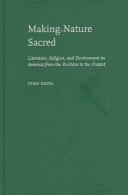
ISBN: 0195165063 0195165055 0198036949 1280558962 9786610558964 1423761677 0199835144 9780195165050 9780195165067 Year: 2004 Publisher: New York: Oxford university press,
Abstract | Keywords | Export | Availability | Bookmark
 Loading...
Loading...Choose an application
- Reference Manager
- EndNote
- RefWorks (Direct export to RefWorks)
John Gatta argues that the religious import of American environmental literature has yet to be fully recognized or understood. 'Making Nature Sacred' explores how the quest for 'natural revelation' has been pursued through successive phases of American literary and intellectual history.
Ecologie dans la littérature --- Ecologie in de literatuur --- Ecology in literature --- Environmental protection in literature --- Godsdienst in de literatuur --- Heilige [Het ] in de literatuur --- Het heilige in de literatuur --- Holy [The ] in literature --- Le sacré dans la littérature --- Literatuur [Ecologie in de ] --- Littérature [Ecologie dans la ] --- Milieubescherming in de literatuur --- Nature dans la littérature --- Nature in literature --- Natuur in de literatuur --- Protection de l'environnement dans la littérature --- Religion dans la littérature --- Religion in literature --- Sacré [Le ] dans la littérature --- The holy in literature --- American literature --- Nature in literature. --- Religion and literature --- Environmental protection in literature. --- Natural history --- Nature --- Holy, The, in literature. --- Religion in literature. --- Ecology in literature. --- Littérature américaine --- Religion et littérature --- Environnement --- Sciences naturelles --- Sacré dans la littérature --- History and criticism. --- Religious aspects. --- Histoire et critique --- Protection, dans la littérature --- Aspect religieux --- Holy, The, in literature --- History and criticism --- Religious aspects --- Littérature américaine --- Nature dans la littérature --- Religion et littérature --- Sacré dans la littérature --- Religion dans la littérature --- Ecologie dans la littérature --- Protection, dans la littérature --- United States --- History --- American literature - History and criticism --- Religion and literature - United States --- Natural history - United States --- Nature - Religious aspects
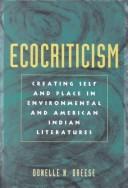
ISBN: 9780820456614 0820456616 Year: 2002 Volume: v. 15 Publisher: New York : Peter Lang,
Abstract | Keywords | Export | Availability | Bookmark
 Loading...
Loading...Choose an application
- Reference Manager
- EndNote
- RefWorks (Direct export to RefWorks)
American literature --- Environmental literature --- Indians of North America --- Environmental protection in literature. --- Environmental policy in literature. --- Wilderness areas in literature. --- Landscapes in literature. --- Ecology in literature. --- Indians in literature. --- Nature in literature. --- Self in literature. --- Ecocriticism. --- Littérature américaine --- Ecologie --- Indiens d'Amérique --- Environnement --- Réserves de la vie sauvage dans la littérature --- Paysages dans la littérature --- Ecologie dans la littérature --- Indiens d'Amérique dans la littérature --- Nature dans la littérature --- Moi dans la littérature --- Ecocritique --- Indian authors --- History and criticism. --- Intellectual life. --- Auteurs indiens d'Amérique --- Histoire et critique --- Documentation --- Vie intellectuelle --- Protection, dans la littérature --- Politique gouvernementale dans la littérature --- Littérature américaine --- Indiens d'Amérique --- Réserves de la vie sauvage dans la littérature --- Paysages dans la littérature --- Ecologie dans la littérature --- Indiens d'Amérique dans la littérature --- Nature dans la littérature --- Moi dans la littérature --- Auteurs indiens d'Amérique --- Protection, dans la littérature --- Politique gouvernementale dans la littérature --- Ecocriticism --- Ecology in literature --- Environmental policy in literature --- Environmental protection in literature --- Indians in literature --- Landscapes in literature --- Nature in literature --- Self in literature --- Wilderness areas in literature --- Nature in poetry --- Landscape in literature --- Indians of Central America in literature --- Indians of Mexico in literature --- Indians of North America in literature --- Indians of South America in literature --- Indians of the West Indies in literature --- Ecological literary criticism --- Environmental literary criticism --- Criticism --- English literature --- Agrarians (Group of writers) --- History and criticism --- Indian authors&delete& --- Intellectual life
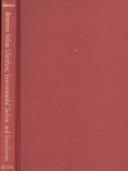
ISBN: 0816517924 0816517916 9780816517923 9780816517916 Year: 2001 Publisher: Tucson : University of Arizona Press,
Abstract | Keywords | Export | Availability | Bookmark
 Loading...
Loading...Choose an application
- Reference Manager
- EndNote
- RefWorks (Direct export to RefWorks)
Although much contemporary American Indian literature examines the relationship between humans and the land, most Native authors do not set their work in the "pristine wilderness" celebrated by Adamson challenges complacency throughout her book. . . . a truly innovative study that should be in all academic collections. —Choice Her persuasive and passionate arguments call her readers to awareness and responsibility. —ISLE Powerful and immensely readable. —Folklore mainstream nature writers. Instead, they focus on settings such as reservations, open-pit mines, and contested borderlands. Drawing on her own teaching experience among Native Americans and on lessons learned from such recent scenes of confrontation as Chiapas and Black Mesa, Joni Adamson explores why what counts as "nature" is often very different for multicultural writers and activist groups than it is for mainstream environmentalists. This powerful book is one of the first to examine the intersections between literature and the environment from the perspective of the oppressions of race, class, gender, and nature, and the first to review American Indian literature from the standpoint of environmental justice and ecocriticism. By examining such texts as Sherman Alexie's short stories and Leslie Marmon Silko's novel Almanac of the Dead, Adamson contends that these works, in addition to being literary, are examples of ecological criticism that expand Euro-American concepts of nature and place. Adamson shows that when we begin exploring the differences that shape diverse cultural and literary representations of nature, we discover the challenge they present to mainstream American culture, environmentalism, and literature. By comparing the work of Native authors such as Simon Ortiz with that of environmental writers such as Edward Abbey, she reveals opportunities for more multicultural conceptions of nature and the environment. More than a work of literary criticism, this is a book about the search to find ways to understand our cultural and historical differences and similarities in order to arrive at a better agreement of what the human role in nature is and should be. It exposes the blind spots in early ecocriticism and shows the possibilities for building common ground— a middle place— where writers, scholars, teachers, and environmentalists might come together to work for social and environmental change.
American literature --- Indians of North America --- Environmental justice --- Environmental protection in literature. --- Wilderness areas in literature. --- Ecology in literature. --- Indians in literature. --- Nature in literature. --- Ecocriticism. --- Littérature américaine --- Indiens d'Amérique --- Justice environnementale --- Environnement --- Réserves de la vie sauvage dans la littérature --- Ecologie dans la littérature --- Indiens d'Amérique dans la littérature --- Nature dans la littérature --- Ecocritique --- Indian authors --- History and criticism. --- Intellectual life. --- Auteurs indiens d'Amérique --- Histoire et critique --- Vie intellectuelle --- Protection, dans la littérature --- Amerikaans. --- Ecologische aspecten. --- Environmental justice. --- Gerechtigkeit. --- Indianen. --- Indianer. --- Letterkunde. --- Literatur. --- Milieubescherming. --- Natur --- Strafrechtelijk milieurecht. --- Umweltethik. --- Umweltschutz. --- Indian authors. --- USA. --- United States. --- Littérature américaine --- Indiens d'Amérique --- Réserves de la vie sauvage dans la littérature --- Ecologie dans la littérature --- Indiens d'Amérique dans la littérature --- Nature dans la littérature --- Auteurs indiens d'Amérique --- Protection, dans la littérature --- Environmental protection in literature --- Wilderness areas in literature --- Ecology in literature --- Indians in literature --- Nature in literature --- Ecocriticism --- Ecological literary criticism --- Environmental literary criticism --- Criticism --- Nature in poetry --- Indians of Central America in literature --- Indians of Mexico in literature --- Indians of North America in literature --- Indians of South America in literature --- Indians of the West Indies in literature --- Indian authors&delete& --- History and criticism --- Intellectual life --- English literature --- Agrarians (Group of writers) --- Écologie --- Indiens --- Auteurs indiens --- Dans la littérature
| Listing 1 - 10 of 13 | << page >> |
Sort by
|

 Search
Search Feedback
Feedback About UniCat
About UniCat  Help
Help News
News